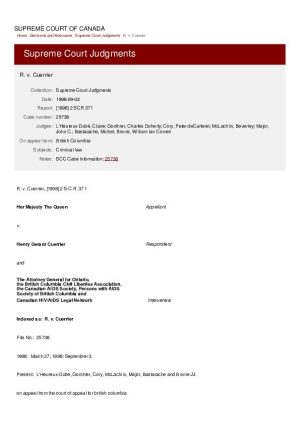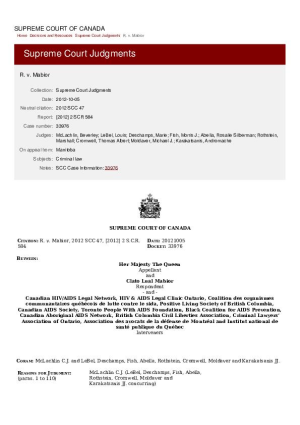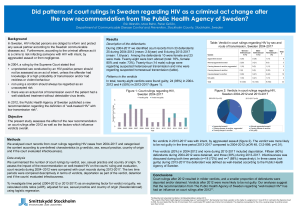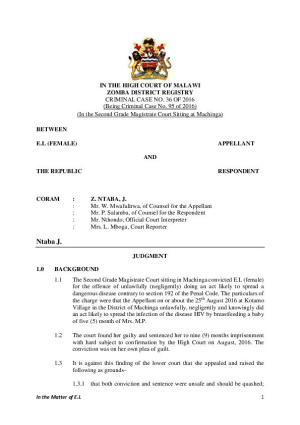Clarifies that recklessness regarding HIV transmission risk is not the same as intention to transmit HIV. This ruling means that if people are convicted of having sex without disclosing their HIV status, they will be convicted of lesser charges with lower penalty.
Understanding the Law
Precedent setting cases
Criminal prosecutions for HIV non-disclosure, exposure and transmission have occurred in jurisdictions all over the world. Some recent prosecutions have brought welcome decisions, for example, those that pay close attention to current scientific evidence showing some acts included negligible or no HIV transmission risk. At other times, decisions have been remarkably conservative in their approach to risk or have ignored HIV science altogether.
New Zealand Police v Justin William Dalley
Clarifies that use of a condom satisfies the requirement to take ‘reasonable care’ to prevent HIV transmission during vaginal sex, and that ‘failsafe’ precautions are not required by law. Also finds that oral sex without a condom (and without ejaculation) satisfies the standard of ‘reasonable care and precautions’. This ruling means that disclosure of HIV status before vaginal sex is not required as long as a condom is used. Disclosure before oral sex is not required.
Her Majesty the Queen v. Henry Gerald Cuerrier
Ruling that failure to disclose HIV status constitutes fraud. Consequently, a partner’s consent to unprotected sexual activity is not valid. This ruling allows people with HIV in Canada who do not disclose their HIV-status before sex to be prosecuted under sexual assault laws.
R. v. Mabior
Ruling on "significant risk of bodily harm" which ostensibly found that people with HIV in Canada do not need to disclose their HIV-status before sex only if (i) the accused’s viral load at the time of sexual relations was low, and (ii) condom protection was used.
Did patterns of court rulings in Sweden regarding HIV as a criminal act change after the new recommendation from The Public Health Agency of Sweden?
The study assesses the effect of the new recommendations from the Public Health Agency of Sweden on court rulings after 2012 as well as the factors which influence verdicts overall.
E.L. Judgement, Malawi High Court (2016)
On 19 January 2017, the Zomba High Court in Malawi delivered a landmark ruling on the application of criminal law to cases of HIV transmission and exposure through breastfeeding.
The appellant was a woman living with HIV who was convicted of negligently and recklessly doing an act which is “likely to spread the infection of any disease which is dangerous to life” under section 192 of the Malawi Penal Code for accidentally breastfeeding another person’s child. She was unrepresented at her trial and sentenced to nine months’ imprisonment.
Before the High Court, she appealed her conviction and sentence and challenged the constitutionality of section 192 of the Penal Code for being vague and overbroad. She raised expert evidence to show the “infinitesimally small risk” of HIV transmission by women on antiretroviral treatment through breastfeeding. The State agreed that the appellant’s conviction and sentence should be overturned and set aside.
At the hearing on 2 December 2016, the Court, per Ntaba J, granted an order that the appellant’s identity be concealed to protect her confidentiality and that of the children concerned.
On 19 January 2017, the High Court acquitted the appellant and ordered her immediate release. It held that the proceedings in the trial court were irregular and “blatantly bias” against the appellant, compromising her right to a fair trial. The Court held that the appellant did not have the requisite knowledge or belief that breastfeeding the complainant’s child was likely to spread HIV and cautioned against the misapplication of criminal law in cases of HIV transmission and exposure. The Court recommended the constitutional challenge be filed for separate determination considering the national interest in the issue.
The appellant was represented by Mr Wesley Mwafulirwa of John Tennyson Associates.
- Alternative links
- HJN feature on the impact of this case, SALC resources on this case
Semba Judgement, High Court of Zimbabwe (2015)
Judge Charles Hungwe's reasoning that allowed the appeal on behalf of a 26 year old woman, was charged with the crime of deliberate transmission of human immunodeficiency virus (“HIV”) as defined in s 79 (1) (a) of the Criminal Law Code for briefly mistakenly breastfeeding another woman's baby.
The judgement found that the prosecution was "ill-conceived as the legislature did not intend that breast-feeding by infected but ignorant women be criminalised. In any event there was no proof that the appellant fully appreciated that her conduct would result in HIV transmission. In the result she was entitled to an acquittal at her trial."
- Alternative links
- Traduction française automatisée, Brief news story on post-appeal aquittal







